FRA’s second bulletin on ‘The Russian war of aggression against Ukraine: the broad fundamental rights impact in the EU’ explores throughout the EU the wide array of issues countries need to address to ensure people’s fundamental rights are upheld, in the largest mass movement of people to the EU since World War 2. It also identifies good practices for other countries to follow.
The EU Temporary Protection Directive entitles those displaced to settle and integrate in the EU. It grants them the right to work and to access services, including healthcare and education. But there can be delays and difficulties informing displaced people about their rights.
Displaced people are also protected under the EU legislation addressing human trafficking, hate crime and rights of victims of crime.
The key fundamental rights issues identified in the bulletin include:
- Trafficking and sexual violence - the risk of trafficking and sexual exploitation remains high. The EU and many countries took counter measures to reduce this risk. This included registering people offering transport and private housing, as well as awareness raising and information campaigns.
- Unaccompanied children - some countries created dedicated registration systems for unaccompanied children but gaps remain and practices vary. This increases the risk that children go missing or are trafficked.
- Hate speech and disinformation –there is widespread support for people arriving from Ukraine. However, there are reports of hate speech, harassment and even violence. Xenophobic disinformation and hate speech online remain a cause for concern.
- Roma and people with disabilities - some groups, like Roma, faced additional difficulties accessing their rights under the Temporary Protection Directive. Additionally, not all countries can host children with disabilities who had been in institutions in Ukraine in a child-friendly manner.
- Work - access to employment is held back by practical issues like language and the recognition of qualifications. The shortage of childcare support also hinders employment. Countries are providing support to resolve these issues.
- Housing - countries offer public and private accommodation but capacity issues remain, especially in big cities. Some good vetting practices exist to prevent abuse and protect especially women.
- Welfare - access to social welfare varies but is linked to general or dedicated support schemes. However, allowances can be low and delays can arise due to the additional work when processing requests.
- Healthcare - healthcare is also provided but available services vary, especially in countries where national systems were already struggling to meet pre-existing needs. Language and access to medical records also complicate support.
- Schooling – many schools struggle to include additional pupils from Ukraine. Intensive language and preparatory classes aim to facilitate integration. Some schools also recruit Ukrainian- and Russian-speaking teachers as support.
This bulletin covers the situation across the EU between 16 April and 31 July 2022.
